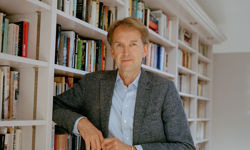
Ian Murray, who became executive director of the Society of Editors after a lifetime in newspapers, originally didn’t want to be a journalist. He really fancied advertising until a teacher changed his mind.
“You like telling a story, you are inquisitive, you are thick-skinned and you can’t spell. You’re perfect for the job,” the teacher said.
The young Murray talked his way into a trainee reporter’s job at his local newspaper, the County Express in Stourbridge despite the “appalling” spelling and by the age of 24, was editing the Kidderminster Shuttle Times – said to be the youngest paid-for editor in England at the time.
A career that included nineteen years editing the Southern Daily Echo in Southampton, as well as overseeing titles in Hampshire, Berkshire and Buckinghamshire turned out to be perfect preparation for running the Society of Editors.
Murray is now in the front-line defending journalists and journalism in the never-ending battle to protect press freedom against an often sceptical public and “politicians and others who have quite deliberately set out to undermine the press”.
Murray’s stories these days are often back to the wall appearances on Newsnight defending press behaviour in the wake of the Manchester bombing or dealing on Radio Ulster with the consequences of the BBC coverage of the Sir Cliff Richard police raid.
Over the top
The Sir Cliff issue posed a particular challenge and demonstrates some of the complexities involved.
Murray was still editing the Southern Daily Echo in Southampton when he watched “agog” in the newsroom at the BBC coverage of the raid on Sir Cliff’s house.
“It was an important story to be told but not to be turned by the BBC into a drama in that way,” says Murray who thinks that the BBC could have avoided a lot of trouble if they had reported the story as the third or fourth item on the news in the normal way.
The lure of the scoop in the wake of the fall-out from the Jimmy Savile affair and associated police inaction led to an overreaction by all involved.
“It was a big news story but what the hell were the police doing breaking into his house at 5am when he wasn’t there and hadn’t been spoken to. What were they hoping to find from an incident that took place 40 years ago,” asks Murray.
He believes on balance however the BBC should have tried to find a way of appealing against the finding that the Corporation infringed Sir Cliff’s privacy because of the wider public interest.
It’s an uphill struggle making the argument for the right to name suspects before charges are laid.
On Radio Ulster, Murray tried to put the case that if we can’t say how and whom the police are investigating “it’s another door closing on freedom, it’s another liberty taken away.”
But the callers to the programme were having none of it.
“They don’t care about any of that. They only care about the terrible way that Cliff has been dealt with,” Murray concedes in what he believes amounts to a self-inflicted wound by the media.
He now fears that “a Cliff’s law” preventing the naming of those under investigation until they have been charged would be a popular measure but hopes that “wiser heads” would prevail in parliament.
For the moment, editors and news editors seem uncertain what to do in the wake of the Sir Cliff finding – is it a one-off case or does it have more general implications and could they be open to further privacy actions for reporting similar police investigations.
Put on the spot
Ian Murray also found his back against the wall in the Newsnight studio defending the behaviour of the media in Manchester after the publication of the Kerslake report into the bombing.
Murray was suddenly asked on air by Lord Kerslake to apologise on behalf of the British press. The Society of Editors director explained he was neither there to speak on behalf of the British press nor could he apologise for them.
The programme has just heard from grieving parents how they had been harassed by reporters.
Lord Kerslake had said that the victim’s evidence was “clear and undeniable” that they had been treated badly by the press.
Murray believes it wasn’t clear and it was deniable, and the Manchester police said afterwards that the British press had behaved in an exemplary way and that it was unclear who was responsible for the harassment.
“To someone who has lost a child and someone is standing on their doorstep harassing them, it matters not at all where the reporter came from,” Murray accepts.
Murray has also been in the battle arguing that the best weapon in the battle against fake news is a properly funded mainstream media.
He welcomes the report from Damian Collins and his Digital, Culture, Media and Sport select committee arguing that fake news on social media sites was a threat to democracy – with one large caveat.
The Society acknowledges that MPs on the committee have recognised that fake news is a serious threat, though surely they should have recognised that anyway. It is equally welcome that they believe that strong action should be taken.
The report underscores the Society of Editors’ emphasis on the importance of trustworthy news.
“There is an irony, a galling irony here: look, you are worried about fake news but here you are doing your bloody best to undermine the organisations who have placed great store in well researched, balanced, legitimate news and information,” Murray argues.
Freedom for all
As for action against the social media giants, Murray warns the industry should be careful what it wishes for.
It is difficult for the SoE to argue for freedom of expression for its 400 members but not for Facebook, Google or Twitter.
“There will have to be some form of regulation, of course, but it should be sensible regulation that doesn’t stifle creativity and a free media along the way,” says Murray who goes on to ask whether it would be possible for the social media to practice self-regulation.
“From the Society of Editors’ point of view, we cannot argue for self-regulation of the printed press but say it is beyond the pale with the digital world. Let’s at least explore,” he says.
Murray hopes the social media giants will increasingly come to the table to engage with the issues and therefore avoid “a hard landing on regulation”.
For Murray, there is always the feeling that defending press freedom is an uphill battle and perhaps always will be, particularly so in the wake of events such as the phone-hacking scandal.
While not condoning phone-hacking, Murray has welcomed “in a curious perverse way” the spotlight that has been shown on the media and the opportunity it presents with friends, associates, audiences to explore what a free press means and what kind of free press they want.
“What is a responsible press, because one man’s responsible newspaper is another’s racist rag, and how far do we tolerate people who put out views we disagree with vehemently,” Murray asks.
Such issues are now being addressed in a way they were not before recent controversies.
Because of the pressures on the British media, Murray believes the Society of Editors has never been more necessary or important as it not only fights for a free press, a free media, freedom of expression, and the public’s right to know, but also backing standards of training and diversity in the media.
Murray began working with the Society of Editors last year after deciding he wanted another challenge after his long stint editing the Southern Daily Echo. He is also an award-winning travel writer and writes theatre reviews at venues such as the Chichester Festival.
Big shoes to fill
He then “stepped into the breech” as executive director after Bob Satchwell was forced to retire by a life-changing illness.
“He was such a power, a force, a fantastic man who has given so much to the industry. He’s sorely missed and everywhere I go, I’m asked if I am the new Bob. Let me just explain that no-one can be Bob,” says his successor.
Plans are being drawn up to launch the annual Satchwell lecture so that his name will be permanently associated with the Society of Editors.
Apart from campaigning on press issues, new controversies are forever coming down the line.
One of the latest is Jeremy Corbyn’s Alternative MacTaggart lecture at the Edinburgh Television Festival when, amid a raft of ideas about the future of the media, the Labour leader suggested that, in future, editors should be elected by their journalists.
That one didn’t go down well with editor Murray.
“Being an editor is not a popularity contest. There are hard decisions to be made, both in editorial and staff matters. The crew of a ship do not elect the captain, the best person is appointed. The idea of electing by staff vote would seem to owe more to political attempts to stifle press freedom than the practical realities of running a newsroom,” says Murray in a typically robust response.
That and many of the other issues raised by Corbyn, such as the creation of a British Digital Corporation and a windfall tax on the social media groups to help pay for public interest journalism, should help stimulate debate at the upcoming Society of Editors’ annual conference.
Ian Murray’s teacher was right. He is inquisitive and he likes telling stories and has done since his schooldays.
“I basically wanted to tell people stories. I could string off lots of famous people I have met but that’s not the point – some live up to expectations and some are way below. The best stories come from ordinary people who don’t often believe they have a story to tell. Those are the ones you remember,” says Ian Murray, local reporter, regional editor and executive director of the Society of Editors.












